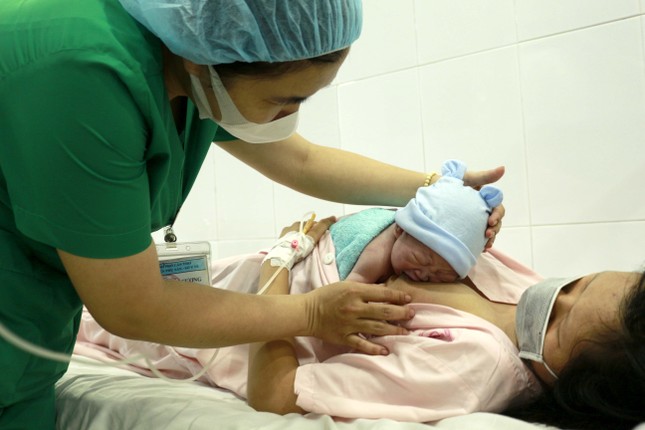One of the key contents of the Population Law draft is the regulation of the responsibilities of agencies and organizations in providing pre-marital couples with knowledge about reproductive health care directly related to married life; child care and education; consolidating the value of having two children in each family, raising children well, and consulting and guiding measures to prevent infertility.
Notably, a breakthrough point of the Population Law draft is to empower individuals and couples in deciding the timing of having children, the number of children, and the interval between births. This is a significant change from the 2003 Population Ordinance (amended in 2008), which had many restrictive provisions.
According to the Ministry of Health, the new regulation will create a unified and synchronized legal corridor, institutionalizing the Party’s guidelines and policies on population work and contributing to effectively addressing emerging population issues such as low birth rates, population aging, and gender imbalance at birth…

Pre-marital health check-ups provide knowledge about reproductive health care
The draft law also stipulates measures to maintain the replacement fertility rate, such as requiring the Government to periodically announce the birth rate status so that localities can base their appropriate policies. For places with extremely low birth rates, the Government will report to the National Assembly for timely intervention solutions.
Proposed increase in maternity leave to 7 months for the second child
Another policy of interest to many workers is the proposal to allow female workers to have 7 months of maternity leave for their second child, instead of 6 months as currently stipulated in the 2019 Labor Code. Other cases will still follow the current regulations.
In addition, the draft also proposes to supplement the housing support policy for women who have given birth to two children in industrial parks, export processing zones, and provinces and cities with low birth rates. This group will be included in the subjects entitled to the policy under Article 76 of the 2023 Housing Law.

Proposed increase in maternity leave to 7 months for the second child
Regarding the reduction of gender imbalance at birth, a long-standing issue, the Population Law draft continues to inherit the regulation prohibiting the selection of fetal gender in any form. The Government will periodically announce the list of localities with high or very high gender imbalance at birth or those that have achieved natural balance.
Notably, the draft proposes increasing administrative fines in the field of population to up to 100 million VND for violations of the Population Law, such as: selecting the gender of the fetus, providing services or equipment for this purpose. The increase in sanctions will lead to amendments to the Law on Handling of Administrative Violations.
Along with this are communication and education measures to eliminate the “male preference” mindset, promote the position of women and girls in the family and society.
Adapting to Population Aging and Improving Population Quality
As Vietnam is entering the stage of population aging, the Population Law draft dedicates a chapter to regulations on coping policies. This includes developing a network of elderly care in the community and concentrated facilities, training geriatric healthcare professionals, and providing financial support for students and caregivers…
Notably, the draft proposes that the State purchase health insurance cards for the elderly who do not have health insurance, ensuring comprehensive healthcare for this population group.
Along with this, the law also proposes measures to improve population quality, such as: pre-marital health consultation and examination; prenatal and neonatal screening, diagnosis, and treatment; especially supporting vulnerable groups such as people in remote, ethnic minority, and disadvantaged areas.
To ensure unity in the legal system, the Population Law draft proposes to amend and supplement a number of articles in other laws such as the Law on Handling of Administrative Violations, the Labor Code, the Housing Law, and the Health Insurance Law… to ensure the effectiveness of the implementation and deployment of population policies.
Currently, the Population Law draft is being widely announced to gather public opinions. The Ministry of Health affirms that the enactment of this law is an important step to ensure that population work is not just about family planning but also linked to long-term socio-economic development, national defense, and security.
The Perfect Work-Life Balance: Experts Propose Shorter Work Hours and Living Wages to Foster Dating and Marriage
Experts advocate for shorter working hours for employees (8 hours/day, 40 hours/week) to allow them ample time to find a life partner, nurture their children, and attend to family matters, thereby promoting population growth.

















